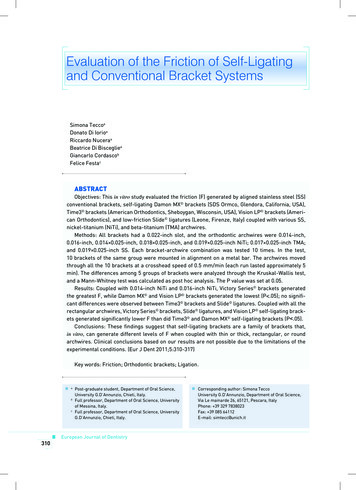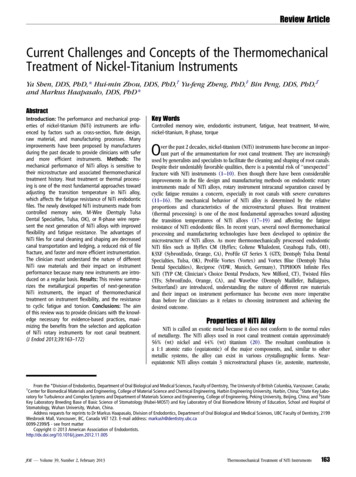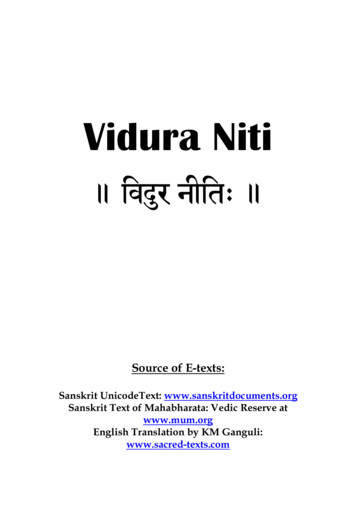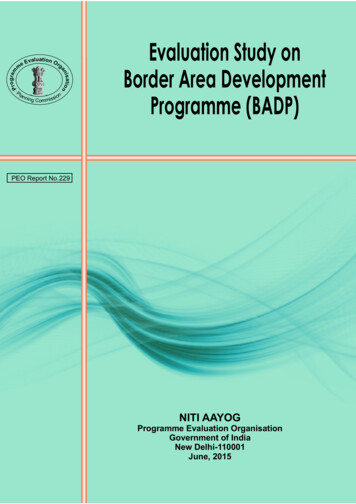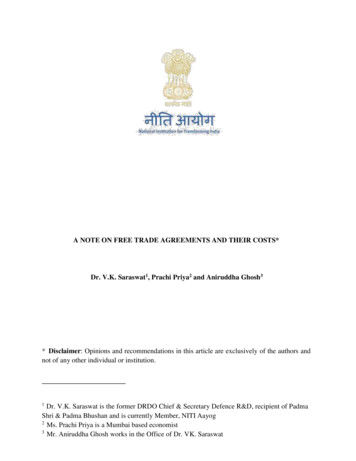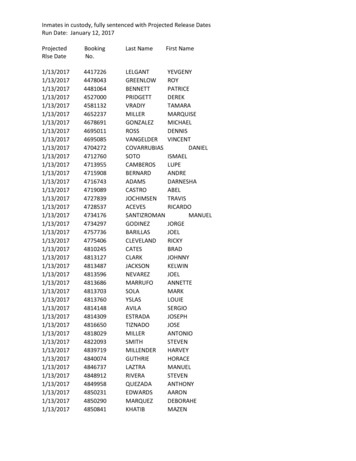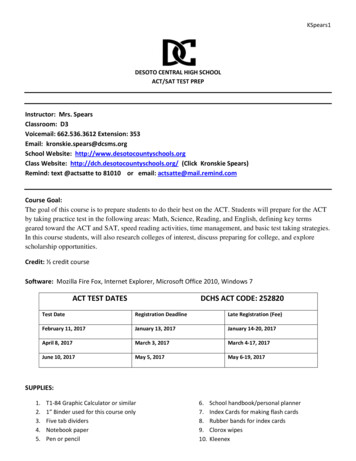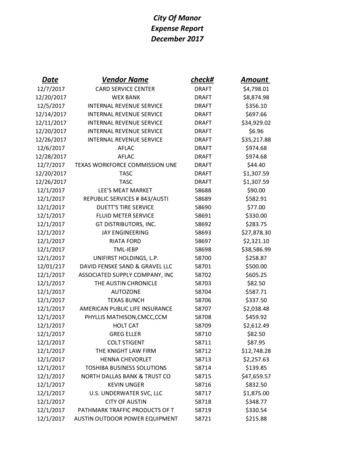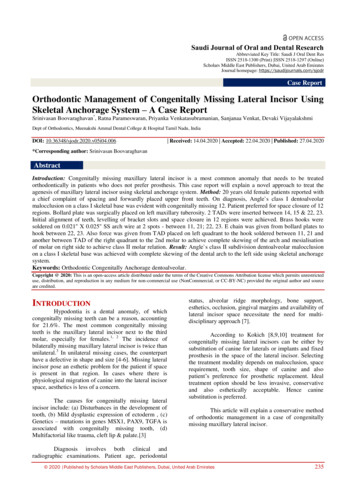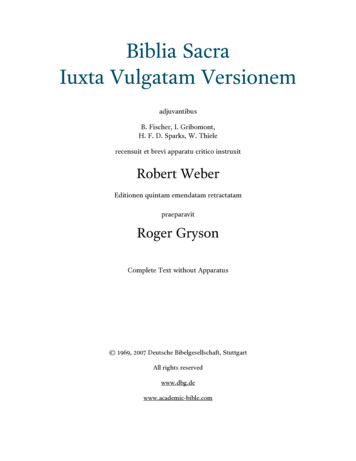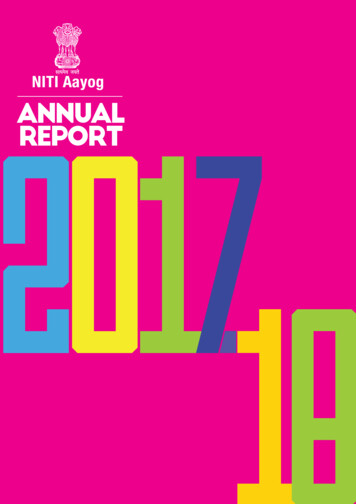
Transcription
2017-18
Table of ContentsI.NITI AAYOG - AN OVERVIEW(i)Organisation Structure2(ii)Objectives and Functions of NITI Aayog4(iii) Administration and Support Units5(iv) Offices Attached to the NITI Aayog7(v)7Economic Advisory Council to PMII. POLICY MAKING AND PROGRAMME(i)The Atal Innovation Mission (AIM)9(ii)Reforms in Homeopathy Central Council Act and the IndianMedicine Central Council Act11(iii) Mumbai-Ahmedabad High Speed Rail (MAHSR) Corridor Project11(iv) Holistic Development of Islands11III COMPETITIVE COOPERATIVE FEDERALISM(i)The Third Meeting of the Governing Council of NITI Aayog14(ii)National Conference of Chief Secretaries of States/UTs on“States on Drivers for Transforming India” held on 10th July, 201715(iii) Development Support Services for States/UTs (DSSS)for Infrastructure Projects17(iv) Reforms in Agriculture(v)a.Model Act on Agricultural Land Leasing18b.Reform of Agricultural Produce Marketing Committee Act19c.Reform of Agricultural Produce Marketing Committee Act:20Key Performance Indicators (KPIs) in Healthcare,Education and Water Sector21(vi) Champions of Change21(vii) GIS based Planning, Management and Monitoring ofGovernment Service Delivery22(viii Dashboard to track progress of development schemes in UTs22(ix) Capacity Building of Urban Local Bodies22IV THINK TANK FUNCTIONS(i)Vision Document of India25(ii)Appraisal Document of 12th Five Year Plan26(iii) Transforming India Lecture Series organised by NITI Aayog26(iv) Doubling of Farmers’ Income26(v)27Outcome Budget and Output- Outcome Framework(vi) Global Entrepreneurship Summit 201729(vii) Launching of programme to transform identified aspirational districts31
VSECTORAL OBJECTIVES AND ACHIEVEMENTS1Agriculture352Health433Women and Child Development474Governance and Research495Human Resource Development556Skill Development and Employment Unit6178Managing UrbanisationRural Development63659 Energy and International Cooperation10 Industry11 Infrastructure12 Financial Resources6772778213Natural Resources and Environment8414Science and Technology87151617State Coordination and Decentralised PlanningSocial Justice and EmpowermentVoluntary Action Cell89919618 Development Monitoring and Evaluation (DMEO)19 Appraisal of Programmes/Schemes/Project20 Water Resources9810510921113Data Management and Analysis22 Information and Broadcasting and Tourism23 National Institute of Labour Economics Research and Development (NILERD)24 Governing Council Secretariat25 Official Language Division (Hindi Section )116117122123262728293031Charts, Maps and Equipment UnitLibrary and Documentation CentreParliament SectionRTI CellCareer Management ActivitiesVigilance Activities12512612712812913032Sectoral Achievements of Organization Methods and Coordination131
NITI Aayog - AN OVERVIEW
Organisation StructureHon’ble PM Narendra ModiChairmanDr. Rajiv KumarVice-ChairmanDr. Bibek DebroyMemberDr. V. K. SaraswatMemberProf. Ramesh ChandMemberAmitabh KantCEORao Inderjit SinghMoS for PlanningDr. Vinod K. PaulMember
AdvisersVerticalsStatesShri Ratan P. Watal, Pr. AdviserSocial SectorShri Yaduvendra Mathur,Addl Secretary (KIH)(Knowledge Innovation Hub)Admn.& GeneralAdministration, AccountsShri Rameshwar Prasad Gupta,Addl Secretary(Team India Hub) &Infrastructure – Energy,International CooperationAnil Srivastava, Adviser &Addl. Charge of DG, DMEOWork relating to shared, connected& electric Mobility and all aspects ofIntelligent transportationM.P & ChhattisgarhShri Alok KumarAdviserAdministration & FRSocial Sector-II (Health, Nutrition,WCD)Uttar Pradesh andTamil NaduShri Alok KumarAdviser (as Link Officer)Human Resource DevelopmentJharkhand & BiharShri Ravinder GoyalAdviserInfrastructure – ConnectivityJ&K, Himachal PradeshMs. Sanyukta Samaddar, OSDGoverning Council Secretariat& CoordinationDr. J. P. Mishra, AdviserAgriculture & Allied SectorsMs. Anna Roy, AdviserData Management & Analysisand IndustryDr.Yogesh Suri, AdviserGovernance & Research andWater ResourcesKarnataka, KeralaShri Jitendra Kumar, AdviserNatural Resources & EnvironmentNE States, Sikkim, GoaSh. Praveen Mahto, AdviserProject Appraisal, PPP and PIBSh. Ashok Kumar Jain, AdviserRural Development, SDGsAP & TelaenganaShri Vikram Singh Gaur, AdviserStates Coordination Division &D.P DivisionMaharashtra &Rajasthan, and UTsShri U.K. Sharma, AdviserScience & TechnologySmt. Sunita Sanghi, AdviserSocial Sector -I (LEM,Skill Development and UD)Punjab & HaryanaShri Srikara Naik, AdviserSocial Justice & EmpowermentWest Bengal & OdishaShri S.S.Ganpathy, AdviserPradhan Mantri Gram SadakYojana(PMGSY)Shri C Angrup BodhDMEO (Admin & Finance)3Gujarat & Uttarakhand
OBJECTIVE AND FUNCTIONS OF NITI AAYOGFounded on 1st January, 2015, the National Institution for Transforming India or NITI Aayog hasbeen created to serve as the think tank of the Government of India. The Prime Minister of India servesas the Chair of the institution.The institution plays a leadership role in policymaking in the central government, works closely withstate governments, serves as a knowledge hub and monitors progress in the implementation ofpolicies and programmes of the Government of India (see the accompanying chart). The institutionprovides the Central and State Governments with relevant strategic and technical advice across thespectrum on key policy elements. These include matters of national and international importance onthe economic front, dissemination of best practices from within the country and from other nations,the infusion of new policy ideas and specific issue-based support.As the premier policy ‘Think Tank’ of the Government of India, NITI Aayog aims to evolve a sharedvision of national development with the active involvement of States. Through consultative and othermechanisms, it endeavours to inform of the best practices developed in one or more States or in otherparts of the world to all States for possible adoption. It fosters cooperative federalism throughstructured support and policy guidance to the States on a continuous basis.The institution designs strategic and long-term policy and programme frameworks and initiatives andmonitors their progress and their efficacy regularly. It uses the lessons learnt from monitoring andfeedback to make innovative improvements, including necessary mid-course corrections. Also, NITIAayog actively monitors and evaluates the implementation of programmes and initiatives, includingthe identification of the needed resources so as to strengthen the prospects of success of the latter.The Aayog publishes policy research papers on contemporary issues, brings out books on bestpractices, prepares model laws to help States reform their policies and organizes workshops andconferences. For providing directional and policy inputs, it serves as a repository of research on goodgovernance and helps disseminate this research to stakeholders.4
NITI Aayog’s entire gamut of activities is divided into two main hubs-Team India Hub andKnowledge and Innovation Hub. The two hubs are at the core of NITI’s efficient functioning. TeamIndia Hub carries out the mandate of fostering ‘Cooperative Federalism’ and ‘Designing Policy andProgramme Frameworks’. It provides requisite coordination and support framework to NITI Aayogin its engagement with the States. Knowledge & Innovation Hub ensures fulfilling the mandate ofmaintaining a State-of-the-Art Resource Centre; to be a repository of research of good governanceand best practices and their dissemination to stakeholders; and to provide advice and encouragepartnerships across key stakeholders including colleges, universities, think tanks andnon-governmental organizations at home and abroad.Team India Hub consists of 6 verticals and Knowledge and Innovation Hub 10 verticals. The list ofverticals is as below:1.Administration2.HRD3.Governing Council Secretariat & Coordination4.Agriculture & Allied Sectors5.Data Management & Analysis6.Governance and Research7.Industry8.Infrastructure-Energy, International Cooperation9.Infrastructure-Connectivity10. Natural Resources & Environment11. Project Appraisal, Public Private Partnership and PIB12. Rural Development13. State Coordination & Decentralized Planning14. Science & Technology15. Social Sector-I (Skill Development, Labour & Employment, Urban Development)16. Social Sector-II (Health & Nutrition, Women & Child Development)17. Social Justice and EmpowermentADMINISTRATION & SUPPORT UNITSThe Administration in NITI Aayog functions in accordance with the service rules and extantGovernment of India instructions issued by the nodal Department, i.e. Department of Personnel &Training (DOPT) on issues relating to personnel management of employees working in the NITIAayog. The Administration is concerned with all aspects of service conditions of the Officers andStaff, viz. recruitment, promotion, postings, transfers, retirement, deputation, Court cases relating toservice matters, besides providing information under the RTI Act on these matters.5
NITI Aayog engaged eleven Consultant/Sr. Consultants including two Consultants with legalbackground for carrying the specific tasks given to NITI Aayog as per the guidelines finalised forengagement of Consultants. One Consultant has been engaged as Consultant Governance andResearch for designing and implementation of portfolio of policy initiatives. Apart from this, NITIAayog also engaged twelve Research Assistants. NITI Aayog also extended the term of fourConsultants engaged earlier whose tasks include but not limited to preparing Vision Document, forpreparing Strategy Paper and Action Plan. To hire these experts, advertisements were issued forinviting online applications. The Administration screened, shortlisted the applications and organisedinterviews to identify suitable candidates.NITI Aayog is facilitating the Young Professionals to have exposure to Public Policy, Planning,Development and the areas that are relevant to development with a view to provide high qualityprofessional inputs in Economics, Finance, Education, Public Health, Social Sciences, Engineering,Urban Planning and Infrastructure amongst others. NITI Aayog issued Advertisement for engaging25 Young Professionals. Administration screened/shortlisted the applications and candidates werecalled for interview. Finally 25 candidates for NITI, 5 for EAC to PM, were selected and issued offerletters to be engaged as Young Professionals on contract basis. Eight (8) candidates for AtalInnovation Mission and 8 for DMEO were also selected and their names were sent to AIM andDMEO respectively for further action at their end. DMEO has also issued the offer letters to theselected candidates.The internship scheme initiated by NITI Aayog in 2016 continued in 2017-18. The internship schemegives an opportunity to the students to give them exposure to the functioning of the IndianGovernment by placing them in various Verticals/Divisions within NITI Aayog. The Scheme seeks toengage students pursuing Undergraduate/Graduate/Post-Graduate Degrees or Research Scholarsenrolled in recognized University/ Institution within India or abroad, as “Interns”. These “interns” aregiven exposure to various Verticals/Divisions/Units within NITI Aayog and are expected tosupplement the process of analysis within NITI Aayog through empirical collection and collation ofin-house and other information. For the “Interns” the exposure to the functioning of the IndianGovernment may be an add-on in furthering their future interests.‘NITI Non-Resident Fellowship Programme’, formulated by Administration Vertical, in December,2016, seeks to draw up on global expertise across sectors of national importance to move beyondconventional planning in formulating Government policy. The programme will enable senior andmid carrier professionals of calibre to carry out substantive research, interact in the Indian policycircuit and work hands-on on policy initiatives. Under this Programme, NITI Aayog engaged aDistinguished Fellow on honorary basis initially for a period of three months, extendable for anotherthree months and his extension order has been issued.Consequent upon the recommendations of the Task Force Report and restructuring of NITI Aayog,the amendment of Recruitment Rules for GCS posts is being carried out.6
OFFICES ATTACHED TO THE NITI AAYOGThe Development Monitoring and Evaluation Office (DMEO) has been constituted on 18thSeptember, 2015 by merging the erstwhile Programme Evaluation Organization (PEO) and theIndependent Evaluation Office (IEO) and notified as an attached office under the aegis of NITIAayog for fulfilling the mandate of evaluation and monitoring assigned to NITI Aayog.The Government of India established the Institute of Applied manpower Research later renamed asNational Institute of Labour Economics Research and Development (NILERD) in 1962. It is aCentral Autonomous Organization attached to NITI Aayog, Ministry of Planning. NITI Aayog ViceChairman, Dr. Rajiv Kumar serves as the President of its General Council, CEO Shri Amitabh Kantis the Chairperson of the Executive Council and Dr. Arup Mitra is the Director General of NILERD.The Primary objectives of this Institution are research, data collection, and education and training inall aspects of Human Capital Planning and Human Resource Development.ECONOMIC ADVISORY COUNCIL TO THE PRIME MINISTERCabinet Secretariat vide Notification No. 1/31/1/2017-Cab dated 26.9.2017 and subsequentNotification dated 1.11.2017 has notified the constitution of the Economic Advisory Council to thePrime Minister with the following composition:Dr. Bibek Debroy, Member, NITI Aayog- ChairmanDr. Surjit Bhalla- Part-time MemberDr. Rathin Roy- Part-time MemberDr. Ashima Goyal- Part-time MemberMs. Shamika Ravi- Part-time MemberShri Ratan P. Watal, Principal Adviser, NITI Aayog- Member-SecretaryTERMS OF REFERENCE OF THE EAC-PM Analyze any issue, economic or otherwise, referred to it by the Prime Minister and advising himthereon. Addressing issues of macroeconomic importance and presenting views thereon to the PrimeMinister. This could be either suo-motu or on reference from the Prime Minister or anyone else. Attending to any other task as may be desired by the Prime Minister from time to time.7
POLICY MAKING AND PROGRAMME
I. THE ATAL INNOVATION MISSION (AIM)The Atal Innovation Mission (AIM) is a flagship initiative of the Prime Minister of India, set up byNITI Aayog to promote innovation and entrepreneurship across the length and breadth of the country.AIM is also envisaged as an umbrella innovation organization that would play an instrumental role inalignment of innovation policies between central, state and sectoral innovation schemes incentivizingestablishment of an ecosystem of innovation and entrepreneurship at various levels higher secondaryschools, science, engineering and higher academic institutions, and SME industry / corporate levels.AIM has adopted a holistic framework in the achievement of its objectivesI. Atal Tinkering Labs – to promote creative, innovative mind set in schoolsAt the school level, AIM is setting up Atal Tinkering Labs (ATL) in schools across all 700 districtsacross the country. These ATLs are dedicated innovation workspaces of 1000-1500 square feet wherelatest technologies like 3D Printers, Robotics, Internet of Things (IOT), Miniaturized electronics doit yourself kits are installed using a grant of Rs 20 Lakhs from the government so that students fromGrade VI to Grade XII can tinker with these technologies and learn to create innovative solutionsusing these technologies, thereby creating a problem solving, innovative mindset within thousands ofstudents across the country. To date, 941 schools have already been selected for ATL Grants andaround 400 of them are already operational. Additionally the process of selecting another 1500schools for ATL Labs is already complete and it is expected that over 2000 schools would havereceived ATL Grants before the end of this financial year.Every school would have an ATL In-charge appointed by the school as well as mentors associated tomentor the ATL students. Over 800 ATL In-charges have received training through AIM and itspartners. AICTE is partnering with AIM to ensure that the closest universities to a school can alsomentor ATL students.Atal Innovation Tinkering challenges are regularly held in the school as well as by AIM every monthto ensure students’ active involvement in creating innovative solutions to solve problems in theircommunity and in the country.Recently the Atal Tinkering Marathon was held in which an estimated 24000 students haveparticipated and 650 of the best innovation entries have been submitted in which the Top 100innovation entries are being showcased in the Atal Tinkering Summit held in New Delhi on 16thDecember 2017 and the Top 30 of these innovations will receive special recognition.The vision is to have every school have access to at least one or more Atal Tinkering Labs in eachdistrict of the country, as well as to scale the same up with the help of state education ministries acrossthe length and breadth of the country. Also Government / Govt Aided schools, and Girls schools,North East and Hilly District schools get a special preference in the consideration of ATL selections.The Atal Tinkering Labs has created much enthusiasm and energy in the schools and students and aBalanced Score Card based approach has been designed to monitor and measure the outcomes of the same.9
II. Atal Incubators – to promote entrepreneurship in universities and industryAt the university, NGO, SME and Corporate industry levels, AIM is setting up world-class AtalIncubators (AICs) that would trigger and enable successful growth of sustainable startups in everysector /state of the country, thereby promoting entrepreneurs and job creators in the countryaddressing both commercial and social entrepreneurship opportunities in India and applicableglobally. AIM is also providing scale up support to existing incubators for scaling up their operations.AIM is providing a grant of upto Rs 10 crores to successful applicants for setting up Greenfieldincubators or scaling up existing ones. The idea is that every one of the 110 named smart cities andthe top 5-10 educational / industrial institutions of every state should aspire to have a world classincubator that will provide the youth / startup communities in the universities / industries opportunityto create new startups.To date 19 Atal Incubators have been selected. Before the end of 2017-2018 we would have 50 AtalIncubators selected. We have had over 2500 applications for the latest round of AIC selectionconcluded on Septermber 30, 2017.Women led incubators and entrepreneurial startups is strongly encouraged by AIM.Again here, the need to scale up with the help of other ministries / states / sectors / public sectororganizations would be crucial to create thousands of job creators in India.III. Atal Vikas Challenges and Atal Grand Challenges – to promote point tech innovations andproduct creations for social and commercial impactTo promote specific product innovations with social / economic impact, AIM will be launchingAtal Vikas Challenges / Atal Grand Challenges in specific areas / sectors of national importancesuch as Affordable Housing, Rural Microfinance Fintech innovations, Universal drinking water,Swaach Bharat / Swaasth Bharat using Robotics / IOT technologies, Renewal and Clean Energy,Universal Drinking water, Augmented and Virtual reality based distance Education, BatteryTechnolgies etc.The successful applicants will get a grant of upto Rs 1 crore for Atal Vikas Challenges and uptoRs 30 crores for Atal Grand Challenges.AIM is also partnering with corporates and other insitutions to launch such challenges tostimulate new product / service development in various sectors. For example the recently heldAIM-Yes Bank Transformation series 2017 Smart Agri Nation challenge had 27000 students from BSchools of India participating in the same with high quality presentations on the same.IV. Mentor India Network – Creating Mentors of ChangeTo enable an ecosystem of innovation, AIM is setting up one of the largest Mentoring networksin India called Mentor India from the professional and industry community who can help mentorstudents at Atal Tinkering Labs and AIC Incubators / startups.10
Over 5000 mentors have already registered and they will be allocated to various ATLs / AICs.Also a number of corporate organizations have volunteered to adopt ATLs/AICs in theirvicinities to ensure close mentoring and success of these initiatives.II. REFORMS IN HOMEOPATHY CENTRAL COUNCIL ACT AND THEINDIAN MEDICINE CENTRAL COUNCIL ACTTo reform Homeopathic Central Council, Indian Medicine Central Council, a Committee under theChairmanship of Vice Chairman, NITI Aayog and comprising Additional Principal Secretary to PrimeMinister, CEO, NITI Aayog and Secretary, Aayush have been constituted with a mandate to examinethe legal provisions and modalities of working of the Homeopathy Central Council Act and the IndianMedicine Central Council Act and suggest necessary reforms. After extensive deliberations, theCommittee finalized the draft National Commission for Homoeopathy (NCH) Bill, 2017 and NationalCommission for Indian System of Medicine Bill, 2017and these Bills have been sent to Ministry ofAYUSH to table in Parliament.III. MUMBAI-AHMEDABAD HIGH-SPEED RAIL (MAHSR) CORRIDORPROJECTNITI Aayog hosted the Sixth Joint Committee Meeting (JCM) on High Speed Railways of MAHSRCorridor Project on 22nd November, 2017, in Delhi. The Indian side was led by Dr. Rajiv Kumar,Vice Chairman (VC), NITI Aayog and Japanese side was led by Dr. Hiroto Izumi, Special Advisor tothe Prime Minister of Japan. In the meeting, issues like Make in India, Transfer of Technology, LoanAgreements, Contractual issues, Land Acquisition, and Technical Issues were discussed. To facilitatespeedy implementation of the project two Working Groups have been created.IV. HOLISTIC DEVELOPMENT OF ISLANDSi. Development of Islands NITI Aayog has been mandated to steer the process of holistic development of identified islandsas unique models of sustainable development Accordingly, in consultation with key stakeholders,NITI Aayog has shortlisted 10 islands for holistic development in the first phase namely Smith,Ross, Long and Aves of Andaman and Nicobar Islands (Package I) Little Andaman of Andamanand Nicobar Islands (Package II) and Minicoy, Bangaram, Tinnakara, Cheriyam and Suheliislands of Lakshadweep (Package III). The consultant engaged by NITI Aayog for preparation of concept development plans anddetailed master plans for Package I and Package III islands have submitted the Draft SiteDevelopment Potential Reports in respect of these two packages in October 2017. As regardsPackage II (Little Andaman), technical and financial evaluation of bids have been completed.Award of work for preparation of concept development plans and detailed master plans is underprogress.11
Island Development Agency (IDA)The IDA was set up on June 01, 2017 under chairmanship of Hon'ble Union Home Minister.CEO NITI Aayog is the Convener of the Agency. It has so far held two meetings i.e. on 24.7.20L7and 8.11.2017, As mandated by the IDA, NITI Aayog is in process of identification of another10-15 Islands in Andaman and Nicobar Islands and Lakshadweep for their development.ii. Development of North-East RegionRoad Map for Development of North Eastern and Eastern StatesA draft Road-map has been prepared in-house in NITI Aayog for development of North-EasternStates and similarly positioned Eastern States i.e. Bihar, Chhattisgarh, Jharkhand, odisha and westBengal. The draft Road-map has been circulated to all concerned central Ministries/Departments andStates for comments' To finalize the draft road map assistance of World Bank shall be taken and allNorth Eastern States, Bihar, Jharkhand, Chhattisgarh, Odisha and West Bengal have been requestedto provide their consent before finalization of Terms of Reference (ToR).12
COMPETITIVE COOPERATIVEFEDERALISM
NITI Aayog has been constituted to actualize the important goal of cooperative federalism and toenable good governance in India, to build strong states that will make a strong nation. In a trulyfederal state, several objectives that ought to be achieved may carry political ramificationsthroughout the country. It is impossible for any federal government to achieve the national objectiveswithout active cooperation from state governments. It is, therefore, crucial that the Centre and Stategovernments work together as equals. Two key aspects of Cooperative Federalism are:(i) Joint development of the National Development Agenda by the Centre and the States,(ii) Advocacy of State perspectives with Central Ministries.In keeping with this, NITI Aayog has been mandated the task of evolving a shared vision of nationaldevelopment priorities, sectors and strategies with the active involvement of States. These prioritiesought to reflect the national objectives and foster cooperative federalism through structured supportto States on a continuous basis. NITI Aayog ought also to help states develop mechanisms toformulate credible plans at the village level and aggregate these progressively at higher levels ofgovernment. The aim is to progress from a stage when the Centre decided development policies to atruly federal government wherein States are equal stakeholders in the planning process.The policy of the Government to involve State governments is reflected in changes in the interactionprocesses of the NITI Aayog. Consistent with its mandate, NITI in 2017-187 has undertaken severalcrucial initiatives to ensure that States are equal partners in the policy making and implementingprocess. This section will discuss in detail each of the initiatives:I. THE THIRD MEETING OF THE GOVERNING COUNCIL OF NITI AAYOGThe third meeting of the Governing Council of NITI Aayog was held under the Chairmanship of thePrime Minister on 23rd April, 2017 at RBCC, President Secretariat, New Delhi. The meeting wasattended by the Minister of Home Affairs, Minister of Railways and Minister of Agriculture &Farmers Welfare - as ex-officio Members, Minister of Road Transport and Highways, Minister ofSocial Justice and Empowerment and Minister of Textile as Special Invitees and also by Minister ofHRD, Minister of State (I/C), Planning, Vice Chairman, NITI Aayog, permanent Members of NITIAayog, CEO, NITI Aayog and senior officials of Government of India. In the meeting minutes of the2nd meeting of the Governing Council were confirmed and Action Taken Report upon the decisionstaken therein was reviewed. Vice Chairman, NITI Aayog made a presentation on a 15 year long termvision, accompanied by a 7 year strategy and a 3 year action agenda. He gave an outline of the draftAction Agenda circulated at the meeting, which had been prepared with inputs from the States.Thereafter CEO, NITI Aayog made a presentation on Action Taken Report and initiatives of NITIAayog. Revenue Secretary made a presentation on GST, explaining the benefits of the system and theway forward. He urged the Chief Ministers to expedite the enactment of State GST Acts.14
Madhya Pradesh Chief Minister, Shri Shivraj Singh Chouhan, made a presentation on doubling offarmers’ income. He touched on areas such as irrigation, technology generation and dissemination,policy and market reforms, e-NAM, livestock productivity etc.The Hon’ble Prime Minister, in his address, touched upon various issues relating to regionalimbalance, use of GeM platform by the States to reduce corruption and increase transparency inGovernment procurement, preparation of a roadmap for better planned and sustainable utilization offunds like the District Mineral Fund and the CAMPA Fund by the States, as per requirements ofindividual States, etc.II. NATIONAL CONFERENCE OF CHIEF SECRETARIES OF STATES/UTS ON “STATESON DRIVERS FOR TRANSFORMING INDIA” HELD ON 10TH JULY, 2017TA conference of Chief Secretaries was held on 10th July, 2017 at Pravasi Bhartiya Kendra, NewDelhi. The conference was attended by Hon’ble Prime Minister, Minister of State (I/C) PlanningCabinet Secretary, Secretaries of Government of India, the Chief Secretaries, Administrators,Secretaries to State Governments in-charge of Planning, Finance, Industry, Health and Agricultureand also by Vice Chairman, Members and CEO, NITI Aayog.15
The inaugural session was addressed by CEO, NITI Aayog, Cabinet Secretary and Vice-Chairman,NITI Aayog. The speakers highlighted key development challenges facing the country and the needto focus on the overall development strategy and implementation with special focus on the backwarddistricts. Thereafter, presentations were made and discussions held on various subjects / sectors.During the conference, each Chief Secretary made a 3 minute presentation on one Best Practice oftheir State which can be replicated. Hon’ble Prime Minister addressed the conference pursuant tothese presentations and gave directions for taking forward the replication of best practices.16
III. DEVELOPMENT SUPPORTINFRASTRUCTURE PROJECTSSERVICESFORSTATES/UTS(DSSS)FORNITI Aayog has implemented a structured initiative for “Development Support Services for States(D3S)” with a vision to achieve transformational, sustained delivery of infrastructure projects withstate of art capacity disseminated at all levels of governance.While there have been success stories in the PPPs in Infrastructure sector, a number of projects havesuffered on account of market failures due to limitations in the prevailing approach to PPPs. Hencethere is a strong need for rebooting infrastructure project delivery models so a sustainableinfrastructure creation cycle is established. A renewed focus of the Government is evident and theaction is geared towards creating PPP success stories at the level
Aayog. The Administration is concerned with all aspects of service conditions of the Officers and Staff, viz. recruitment, promotion, postings, transfers, retirement, deputation, Court cases relating to service matters, besides providing information under the RTI Act on these matters. 1. Administration 2. HRD 3.
